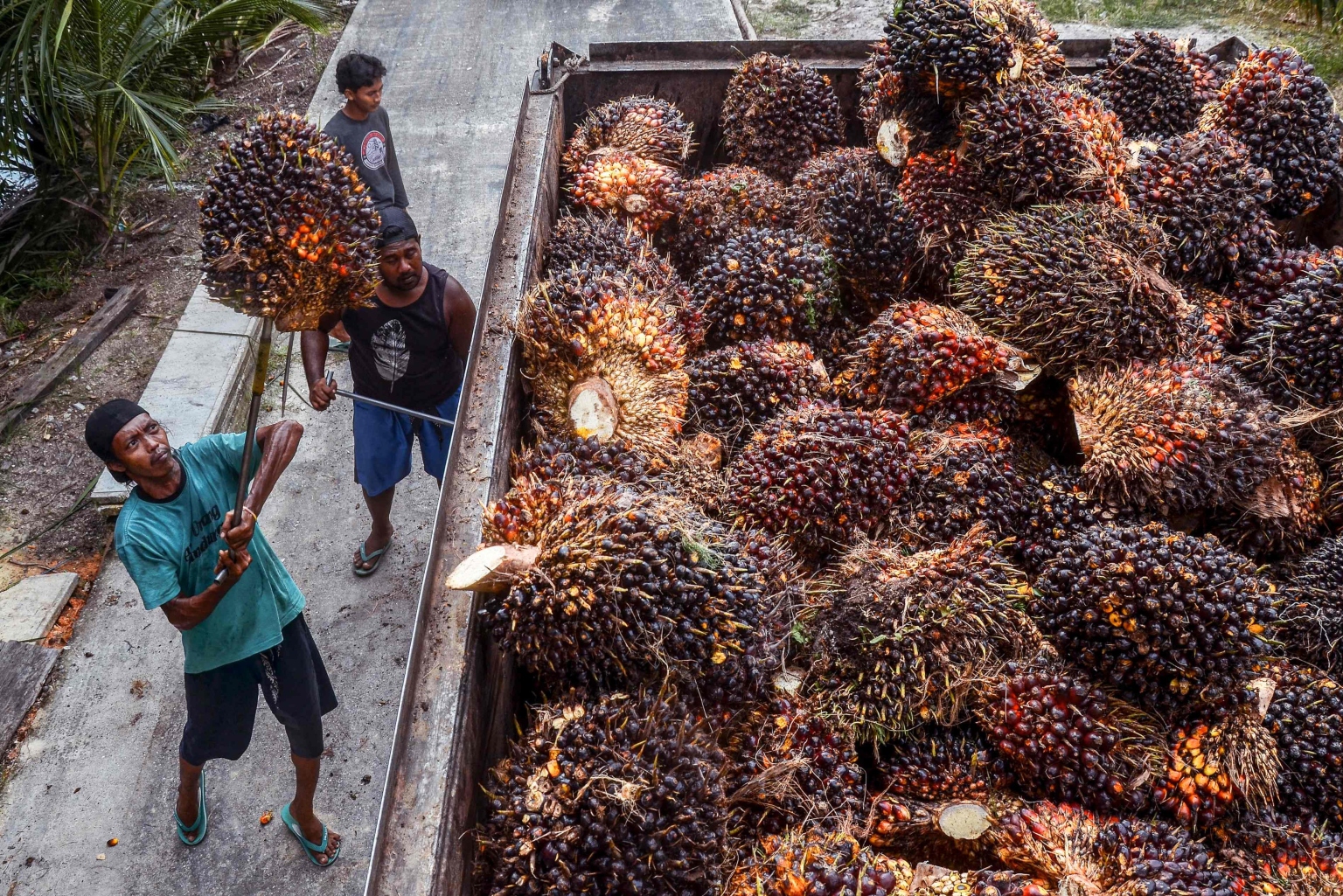Palm oil soars on Indonesia ban in threat to worsen global food inflation
Sign up now: Get ST's newsletters delivered to your inbox

Workers transferring harvested palm fruit for processing at a plantation in Indonesia's Riau province on April 23, 2022.
PHOTO: AFP
Follow topic:
KUALA LUMPUR (BLOOMBERG, REUTERS) - Palm oil rallied on Monday (April 25) after Indonesia, the world's top producer, said it will ban all exports of cooking oil, a move that threatens to worsen global food inflation.
Indonesia said on Friday that the shipment halt will start from April 28 and last until the government deems a domestic shortage resolved. Benchmark palm oil futures jumped as much as 7 per cent on Monday, while Indonesia plantation stocks tumbled.
In Singapore, shares of Golden Agri-Resources, a purely palm oil company, slumped 4.35 per cent as at 3.15pm on Monday, while Olam Group, which produces palm oil among other commodities, fell 1.2 per cent. Wilmar International, one of the world’s biggest traders in palm oil, lost a more limited 0.9 per cent.
The move by Indonesia, which accounts for almost 60 per cent of global palm oil supply, adds to a raft of food protectionism around the world since the war erupted in Ukraine, as governments seek to protect their own food supply with agriculture prices surging. The ban threatens to further stoke global food inflation, which has been accelerating at a rampant pace, and raises the risk of a full-blown hunger crisis.
"The halting of shipments of the cooking oil and its raw material, widely used in products ranging from cakes to cosmetics, could raise costs for packaged food producers globally," said Mr Avtar Sandu, senior manager of commodities at Phillip Nova.
Global edible oil consumers have no option but to pay top dollar for supplies after Indonesia’s surprise ban forced buyers to seek alternatives, already in short supply due to adverse weather and Russia’s invasion of Ukraine.
The move will lift prices of all major edible oils including palm oil, soya bean oil, sunflower oil and rapeseed oil, industry watchers predict. That will place extra strain on cost-sensitive consumers in Asia and Africa hit by higher fuel and food prices.
“Indonesia’s decision affects not only palm oil availability, but also vegetable oils worldwide,” said Mr James Fry, chairman of commodities consultancy LMC International.
Palm oil accounts for nearly 60 per cent of global vegetable oil shipments, and Indonesia accounts for around a third of all vegetable oil exports.
“This is happening when the export tonnages of all other major oils are under pressure: soya bean oil due to droughts in South America; rapeseed oil due to disastrous canola crops in Canada; and sunflower oil because of Russia’s war on Ukraine,” Mr Fry said.
Vegetable oil prices have already risen more than 50 per cent in the past six months as factors from labour shortages in Malaysia to droughts in Argentina and Canada - the biggest exporters of soya bean oil and canola oil respectively - curtailed supplies.
Buyers were hoping that a bumper sunflower crop from top exporter Ukraine would ease the tightness, but supplies from Kyiv have stopped because of what Russia calls its “special operation” in the country.
This had prompted importers to bank on palm oil being able to plug the supply gap until Indonesia’s shock ban delivered a “double whammy” to buyers, said Mr Atul Chaturvedi, president of the Solvent Extractors Association of India, a trade body.
No alternative
Importers such as India, Bangladesh and Pakistan will try to increase palm oil purchases from Malaysia, but the world’s second-biggest palm oil producer cannot fill the gap created by Indonesia, Mr Chaturvedi said.
Indonesia typically supplies nearly half of India’s total palm oil imports, while Pakistan and Bangladesh import nearly 80 per cent of their palm oil from Indonesia.
“Nobody can compensate for the loss of Indonesian palm oil. Every country is going to suffer,” said Mr Rasheed JanMohd, chairman of the Pakistan Edible oil Refiners Association.
In February, prices of vegetable oils jumped to a record high as sunflower oil supplies were disrupted from the Black Sea region.
As Indonesia has allowed loading until April 28, consuming countries will have enough supply for the first half of May, but could face shortages from the second half, said a refiner based in Dhaka.
South Asian refiners will only slowly release oil into the market as they know supplies are limited, he said.
In India, the world’s biggest vegetable oil importer, palm oil prices rose by nearly 5 per cent over the weekend as the industry prices in shortages in the coming months. Prices also rose in Pakistan and Bangladesh.

